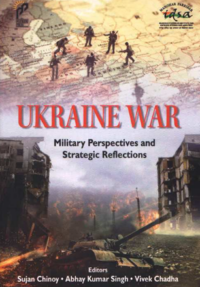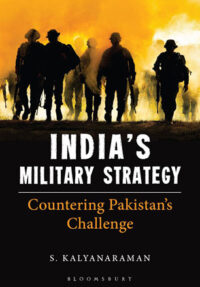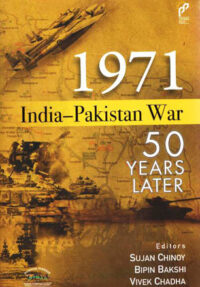Pakistani Nuclear Use and Implications for India
The robustness of India's nuclear doctrine would face a severe challenge in the case of conventional military offensives into Pakistan in a future Indo-Pak conflict. Such offensives are possible in case Pakistan's nuclear threshold is taken as high and its doctrine one of 'last resort'. However, Pakistani nuclear use options may include lower order nuclear use. In light of this, it recommends that India take a serious look at the Limited War concept as well as revise its nuclear doctrine to 'flexible nuclear retaliation'.
The Interface of Strategic and War Fighting Doctrines in the India–Pakistan Context
There has been a shift to a deterrent strategic doctrine with an offensive bias. India's strategic doctrine is thus potentially a compellent one. However, cognizance of the need for limitation to conflict in the nuclear age entails identification of the implications of compellence for both conventional and nuclear doctrines. On the conventional plane, the hiatus between pivot corps and strike corps offensives is taken as a key 'exit point' for war termination efforts.
Reflections on the Kargil War
The Kargil conflict can be categorized as a 'limited war'. It was initiated by Pakistan to achieve mixed military and political objectives, but made important misjudgments that doomed the enterprise to failure. The questions discussed in this article are: why was India surprised; why did both countries observe such great restraint; did the Kargil conflict have a nuclear dimension; and is 'limited war' a viable concept with nuclear deterrence obtaining in South Asia. It also argues that the Kargil conflict was an exception, in some dimensions, to the 'stability-instability paradox'
Trends in Thinking about Warfare
Militaries the world over need to study and understand lessons from the ongoing military operations in Afghanistan, Iraq, and Lebanon, and the new knowledge needs to be placed in context. Neglected military history itself provides enduring lessons. This article attempts to capture the trends and debates in the understanding of current warfare and outlines how lessons of war are interpreted with a focus on future trends in war-fighting. The article concludes with some policy suggestions and areas for further inquiry.
Conventional War in the Presence of Nuclear Weapons
Nuclear weapons cannot obviate wars, but can change its complexion and influence the manner of its conduct. In order to keep nuclear weapons from entering into real warfare, it is important to intelligently judge an adversary's nuclear thresholds and to calibrate one's own conventional strikes. For India, the exploration of this space is particularly important in order to deny Pakistan a free hand to indulge in sub-conventional conflict even as it holds the threat of an all-out nuclear war against an Indian conventional response.
Kargil War: Reflections on the Tenth Anniversary
Ten years later, the Kargil War still arouses deep emotions turning around Pakistan's gross perfidy, an intelligence failure, great heroism, military improvisation and innovation, a national upsurge, a most open inquiry leading to a comprehensive review of vital issues long closed to scrutiny and reform. Its report, prepared in record time, was uniquely presented to the nation as a commercial publication. (From Surprise to Reckoning: The Kargil Review Committee Report, Sage, New Delhi, December 1999.)
India-US Combined Defence Exercises: An Appraisal
This paper is an endeavour to appraise the importance and 'value' of India-US defence exercises for Indian policy makers. It examines their dividends, costs, and pitfalls. The paper argues that such combined exercises are not only useful in functional terms but are also necessary. While such exercises are invariably embedded in inter-state relations and grand-strategic issues, in this case the paper confines itself to operational and military-strategic issues.
Who Won the Second Israel-Lebanon War?
In the immediate aftermath of the Second Israel-Lebanon War, most observers have concluded that Israel lost its war against Hezbollah. Although at the end of 34 days of violent engagement there is no clear victor or loser, this article, on the contrary, argues that Israel succeeded in achieving the most important among its political and strategic objectives.
Issues and Challenges in Modern Peace Operations
In the last decade, there have been fundamental changes in the nature, form and variety of peace operations. In fact, the very coining of a new term, ‘Peace Operations’ (PO), as distinct from the earlier ‘Peacekeeping Operations’ (PKOs), illustrates a new degree of diversity and complexity in these operations. India has been, and continues to be, a major player in UN Peacekeeping Operations (UNPKOs). It has participated in 41 of the 59 UN Missions established so far and has contributed more than 70,000 personnel.













